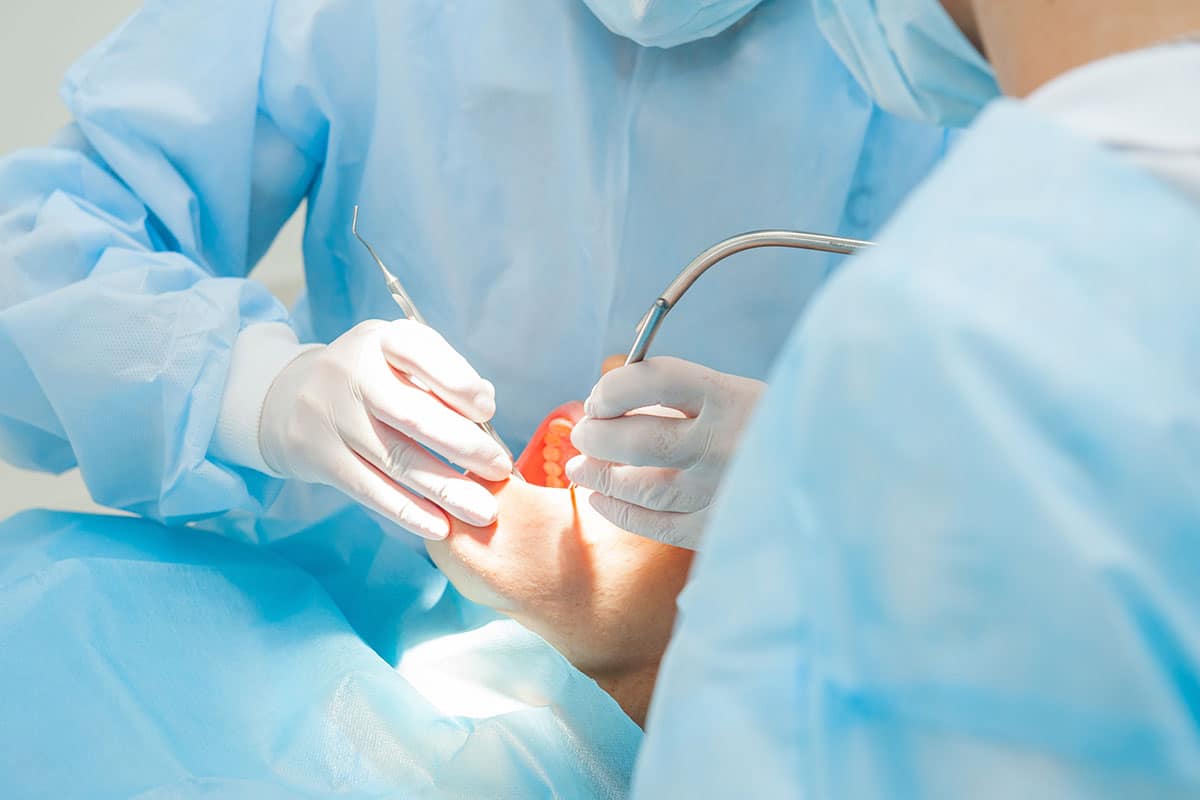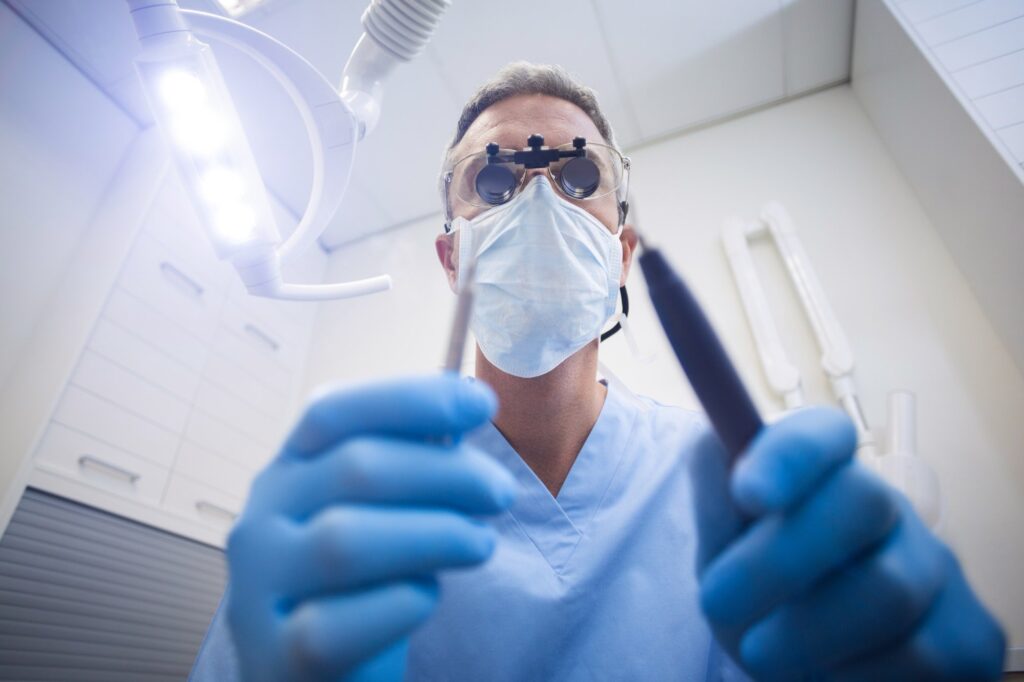Oral surgery might sound daunting, but it’s a common and often necessary step towards achieving and maintaining optimal dental health. From Tooth Extraction to Wisdom Teeth Removal, these procedures ensure that your smile remains radiant and functional. Let’s delve into the world of oral surgery and understand its significance.
Tooth Extraction: When Is It Necessary?
While preserving natural teeth is always the primary goal, there are situations where extraction becomes inevitable:
- Severe Decay: When a tooth is extensively decayed and cannot be saved even with treatments like root canals.
- Overcrowding: Sometimes, teeth need to be removed to make space for orthodontic treatments.
- Impacted Teeth: Teeth that fail to emerge from the gums properly can lead to pain and misalignment.
The process involves numbing the area, loosening the tooth, and then removing it. Post-extraction care is crucial, and patients are often advised to avoid certain foods and activities to ensure proper healing.
Wisdom Teeth Removal: A Rite of Passage
Wisdom teeth, or third molars, typically emerge in late adolescence or early adulthood. While they were once essential for our ancestors who had a different diet, they’re now somewhat redundant. Problems arise when:
- There’s not enough space, leading to crowding or impaction.
- They emerge at an incorrect angle.
- They’re hard to clean due to their location, leading to decay.

Emergency dentistry often deals with issues related to impacted or infected wisdom teeth. Removal is a standard solution, and with oral sedation, the process is comfortable and stress-free.
The Importance of Post-Surgery Care
After undergoing any oral surgery, post-operative care is crucial:
- Pain Management: Over-the-counter pain relievers and prescribed medications can help manage discomfort.
- Dietary Adjustments: Soft foods and plenty of fluids are recommended. Avoid hot, spicy, or crunchy foods.
- Oral Hygiene: Gentle cleaning around the surgical site is essential. Rinsing with warm salt water can aid healing.
- Follow-up Appointments: Regular check-ups post-surgery ensure everything is healing correctly.
Recovery After Wisdom Teeth Removal: What to Expect
The removal of wisdom teeth is a common oral surgical procedure, but like any surgery, it comes with a recovery period. Patients often have questions about the recovery process, especially concerning the duration and their ability to resume daily activities. Let’s address these concerns.
- How Long Will It Take to Recover from Wisdom Teeth Removal?
Recovery time can vary based on the complexity of the extraction and individual healing rates. Here’s a general timeline:- First 24 Hours: Swelling, pain, and bleeding are most pronounced during this period. It’s crucial to follow all post-operative instructions, like using gauze to manage bleeding and applying ice packs to reduce swelling.
- 2-3 Days: Most of the acute symptoms start to subside. However, some swelling and discomfort might persist. It’s essential to continue with a soft food diet and avoid vigorous physical activity.
- 7-10 Days: By this time, most patients feel significantly better. Any stitches used during the procedure might be ready for removal.
- 2 Weeks: Most of the healing is complete, though some minor sensitivity or discomfort might persist, especially if the wisdom teeth were impacted.
- Can I Go to Work the Next Day After Wisdom Teeth Removal?
While many people feel better within a day or two after the surgery, it’s generally advisable to take at least one day off after the procedure. Here’s why:- Pain and Discomfort: Even with pain medications, some level of discomfort is expected.
- Swelling: The face might be visibly swollen, which can be uncomfortable and might affect one’s confidence in professional settings.
- Medications: Pain relievers or sedatives might cause drowsiness, making tasks that require concentration challenging.
- Dietary Restrictions: Eating might be tricky, especially if your job doesn’t allow for frequent breaks to manage your soft food diet.
- If your job involves physical labor, it’s even more crucial to take some time off to ensure proper healing.
Diet After Wisdom Teeth Removal: Navigating the Do’s and Don’ts
One of the most crucial aspects of recovery after wisdom teeth removal is diet. What you eat (or avoid eating) can significantly impact the healing process. Let’s break down the dietary recommendations for the days following the procedure.
- What Not to Eat After Wisdom Teeth Removal?
The days immediately following the surgery are critical for healing. Here are some foods and beverages to avoid:- Hot Foods and Drinks: Warm soups or teas can increase blood flow, potentially dislodging the blood clot that forms in the extraction site, leading to a painful condition called dry socket.
- Crunchy and Hard Foods: Items like chips, nuts, and hard candies can traumatize the surgical site.
- Sticky Foods: Caramels, gum, and similar foods can stick to the extraction site or even pull out stitches.
- Spicy Foods: These can irritate the surgical site.
- Alcoholic Beverages: Alcohol can interfere with the medications prescribed and slow down the healing process.
- Straws: Using a straw can create a suction that might dislodge the blood clot, so it’s best to avoid them for a few days.
- What Can You Eat on Day 3 of Wisdom Teeth Removal?
By day 3, the initial acute phase of healing is typically over, and you can start introducing a wider variety of foods, though caution is still advised. Here are some suitable options:- Soft Pasta: Overcooked pasta or macaroni and cheese can be gentle on the surgical sites.
- Mashed Potatoes: Ensure they are lukewarm and not too hot.
- Scrambled Eggs: These provide protein without requiring much chewing.
- Smoothies: A blend of fruits, yogurt, and protein powder can be both nutritious and soothing. Remember to avoid using a straw.
- Lukewarm Soups: Broths or creamy soups can be comforting and easy to consume.
- Puddings and Applesauce: These can satisfy a sweet craving without being too hard or sticky.
Casey Dental: Your Partner in Oral Health

Whether it’s a simple tooth extraction or the removal of impacted wisdom teeth, Casey Dental offers expert solutions tailored to individual needs. With state-of-the-art equipment, including dental x-rays, and a team of dedicated professionals, patients are assured of quality care.
From preventive measures like dental cleanings and fluoride treatments to advanced procedures like single-tooth implants, Casey Dental stands as a beacon of dental excellence.
Conclusion: Embrace the Journey to Dental Wellness
Oral surgery, while it might sound intimidating, is often a pathway to a healthier, more radiant smile. By understanding the procedures and trusting in expert hands, patients can navigate their dental journey with confidence and ease.
Frequently Asked Question
When is tooth extraction necessary according to Casey Dental?
Tooth extraction is necessary at Casey Dental when a tooth is severely decayed and cannot be saved even with treatments like root canals, or when there is overcrowding that necessitates removal to make space for orthodontic treatment.
What should I expect during recovery after wisdom teeth removal?
During recovery after wisdom teeth removal, you can expect some swelling and discomfort. It’s important to follow post-surgery care instructions, such as taking prescribed medications, applying ice packs to reduce swelling, and sticking to a soft food diet to ensure a smooth recovery process.
Why is post-surgery care important after oral surgery?
Post-surgery care is crucial after oral surgery to prevent complications such as infection, promote healing, and ensure the best possible outcome. Proper care includes following dietary guidelines, taking medications as prescribed, and attending follow-up appointments with your dentist.


